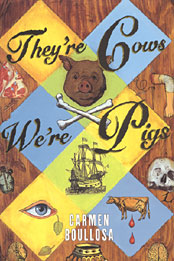
Son Vacas, Somos Puercos
(They’re Cows, We’re Pigs)
Descripción del editor:
The emerging societies of the Caribbean in the seventeenth century were a riotous assembly of pirates, aristocrats, revolutionaries, and rogues – outcasts and fortune-seekers, all. Into this New World of bloody chaos and uncertain possibility steps our hero, Jean Smeeks, who at thirteen was taken from Flanders and brought as a slave to Tortuga, the mythic Treasure Island. To his great good fortune, he is initiated into the magic of medicine by le Negre Miel, an African healer, who is poisoned by an unknown assailant, and later by Pineau, a French-born surgeon, who buys Smeeks out of servitude; but he too is violently murdered under mysterious circumstances.
Grieving for his mentors and uncertain of his own path, Smeeks signs on as a medical officer with the Brethren of the Coast. As he puts his hybrid medical knowledge to use treating everything from rampant disease to the wounds of battle, he becomes strangely transformed by the looting, violence, and carousing of pirate life, and by his desire to avenge the deaths of his teachers. Smeeks finds himself both doctor and despoiler, servant and mercenary, native and foreigner, perhaps even male and female, and suspended between two worlds – those of freely roaming and raiding “pigs” and of law-abiding, tradition-bound “cows.”
Written by one of the preeminent voices of the new generation in Latin American fiction, They’re Cows, We’re Pigs is a brazenly original evolution of ribald and grotesque excesses, of villainy and honor among thieves.
Ediciones y traducciones:
Son vacas, somos puercos, Ediciones ERA, Mexico, 1991.
They’re Cows, We’re Pigs, trans. Lee Chambers, Grove Press, New York, 1997
Sir sind Kühe, wir sind Schweine, trans. Erna Pfeiffer, Suhrkamp Verlag, 1992. Frankfurt,
Eux les vaches, nous les porcs, trad. Claude Fell, Le Serpent a Plumes, Paris, 2002.
Reseñas:
Reseña First Things – They’re Cows, We’re Pigs
Fragmentos de reseñas:
Fabiola Santiago:
Unique and memorable . . . Boullosa’s pirate world leaves you as a good book should: thinking. When you embark on its ships, you sail through the degrees of evil, the limits of freedom. Boullosa’s characters build communities, establish New World values and mores, and in the end pay the price.
The Boston Herald
Amanda Heller:
Boullosa captures the thick storytelling texture of the picaresque adventure, then uses this antique form as a springboard into the postmodern . . . striking.
The Boston Globe
Margot Mifflin:
Darkly picaresque . . . Boullosa artfully evokes the blood-soaked reality of the 17th-century pirates.”
Entertainment Weekly
Alvaro Mutis:
Carmen Boullosa’s greatest achievement lies in her creation of an authentic and effective style for the telling of this story-and this is the only way she could have told it so beautifully.
A word-drunk picaresque novel . . . Boullosa’s vivid and visceral descriptions provide hallucinatory images of the pirates’ raping and pillaging, their battles in the jungle and at sea.
New York Times Book Review
This wryly humorous, satiric, and often macabre novel . . . will please sophisticated readers.
Library Journal
A freewheeling but finely tuned work that makes use of magic realize . . . deftly written . . . Regarded as one of the most dazzling of Latin America’s new generation, Boullosa justifies her laurels in this rich work.
Publishers Weekly
